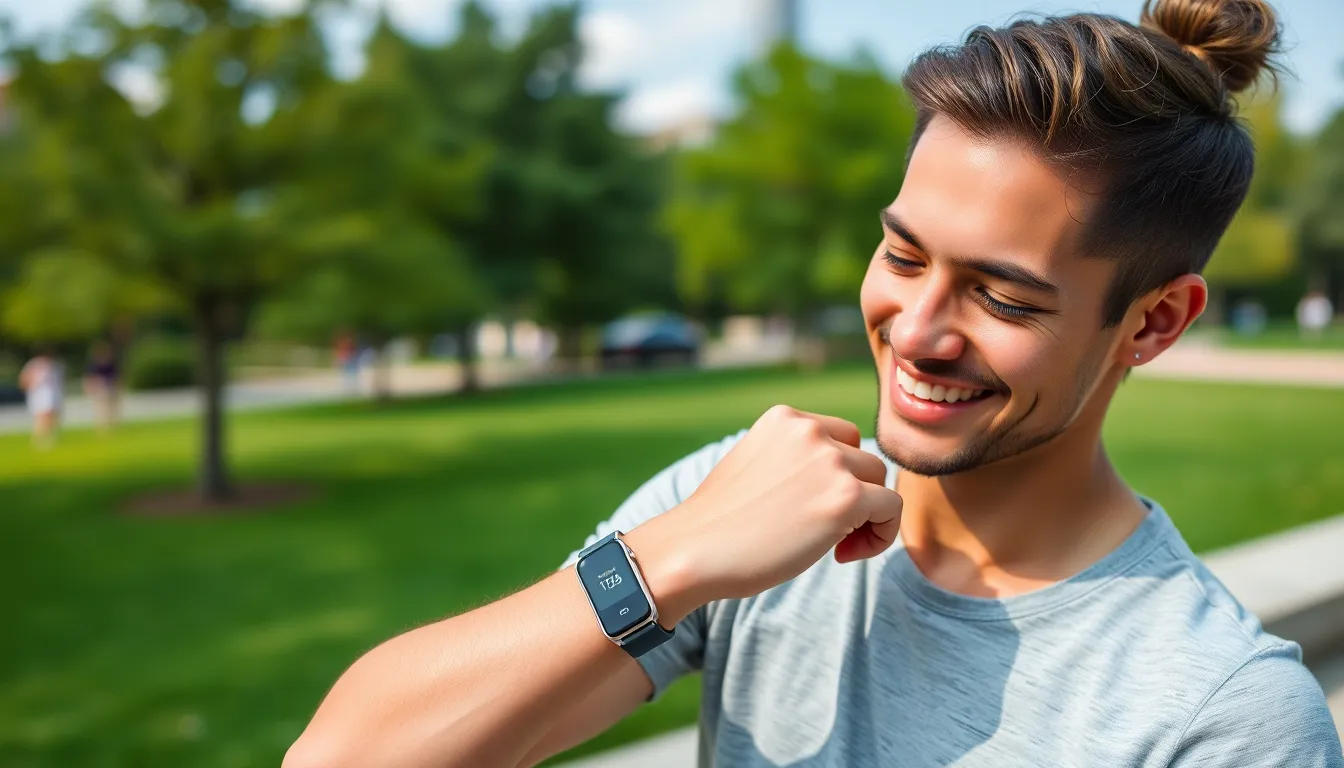In a world where getting lost can mean missing out on life’s best moments, a wearable GPS tracker is like having a trusty sidekick that never leaves your side. Imagine strapping on a device that not only tracks your every move but also keeps you safe from those “where on Earth am I?” moments. It’s like having a personal assistant that whispers directions in your ear—without the awkward small talk.
Table of Contents
ToggleOverview of Wearable GPS Trackers
Wearable GPS trackers serve essential functions for user navigation and safety. These devices provide location tracking while offering features tailored to specific needs.
Definition and Purpose
A wearable GPS tracker is a portable device that uses Global Positioning System technology to determine the user’s location accurately. Primary functions include real-time tracking, route navigation, and distance monitoring. Users rely on these devices for improved safety and increased peace of mind, especially in unfamiliar environments. They often feature additional functionalities, such as fitness tracking and emergency alerts, making them versatile tools for everyday use.
Popular Use Cases
Wearable GPS trackers are popular among various user groups. Children benefit from tracking devices that help parents ensure their safety during outdoor activities. Fitness enthusiasts use these trackers to monitor distances traveled, pace, and health metrics. Elderly individuals gain security from devices that enable caregivers to keep tabs on their whereabouts. Outdoor adventurers also utilize wearable GPS technology for navigation in remote areas, enhancing safety while exploring. Overall, these trackers serve multiple purposes across different demographics, demonstrating their widespread utility.
Key Features of Wearable GPS Trackers

Wearable GPS trackers offer several standout features that enhance their appeal and functionality. Key aspects include accuracy, battery life, and design, all of which influence user experience.
Accuracy and Reliability
Accuracy plays a critical role in wearable GPS trackers. Devices typically use advanced satellite technology to pinpoint locations within a few meters. Features like real-time updates ensure users receive precise tracking information. Reliability stands strong, particularly in urban areas with tall buildings or heavily wooded regions. Users can trust their device to provide consistent data, even in challenging environments.
Battery Life
Battery life influences the overall experience with wearable GPS trackers. Many devices boast long-lasting batteries that operate for several days on a single charge. Users can generally expect performance between 24 hours to a week, depending on usage and settings. Models with energy-saving modes further extend time between recharges. By optimizing battery life, these devices ensure users remain connected without frequent interruptions.
Design and Comfort
Design and comfort significantly enhance user engagement with wearable GPS trackers. Modern designs prioritize ergonomics, allowing wearers to use devices comfortably during various activities. Lightweight materials reduce fatigue during extended use, making these gadgets suitable for everyday wear. Additionally, many trackers feature customizable straps to accommodate different wrist sizes. Attractive aesthetics and functional designs encourage users to incorporate these devices into their daily routines.
Benefits of Using Wearable GPS Trackers
Wearable GPS trackers offer various advantages, enhancing users’ daily lives through improved safety and monitoring capabilities. These devices serve multiple purposes while ensuring convenience and peace of mind.
Enhanced Safety and Security
Enhanced safety remains a primary benefit of wearable GPS trackers. Users gain peace of mind knowing they can track loved ones or belongings. Real-time location updates prevent anxiety over missing children or pets. Alert notifications to designated contacts can quickly notify them of emergencies. In case of a safety concern, these devices provide immediate access to accurate location data, enabling swift assistance.
Fitness Tracking and Health Monitoring
Fitness tracking offers another benefit of wearable GPS trackers. Users monitor activity levels, including steps taken and calories burned, promoting healthier lifestyles. Heart rate monitoring features also assist in understanding personal health trends. With tracking capabilities, users can set fitness goals and receive reminders to stay active. By analyzing activity data, individuals gain insights into their performance, fostering motivation and progress.
Real-Time Location Sharing
Real-time location sharing enhances communication among users. Families and friends can easily stay connected when they share their live locations. This feature proves particularly valuable during outdoor activities or trips. Users can coordinate meetups or check in while traveling in unfamiliar places. The convenience of sharing location fosters trust and safety among users while keeping close connections intact.
Drawbacks of Wearable GPS Trackers
Wearable GPS trackers come with several drawbacks that users should consider.
Privacy Concerns
Users often worry about data privacy when using wearable GPS trackers. Sensitive location information can be vulnerable to unauthorized access or misuse. Some devices might collect additional personal data, raising further privacy issues. Companies may share user data with third parties for advertising or analytics, making users uneasy about their information security. Clear privacy policies and transparent data use practices are essential for mitigating these concerns. Protecting personal privacy remains a top priority for users considering wearable GPS technology.
Technical Limitations
Technical limitations can hinder the effectiveness of wearable GPS trackers. In remote areas, connectivity issues may arise, impacting real-time location updates. Obstacles like tall buildings or dense foliage can interfere with signal accuracy, leading to unreliable tracking. Battery life constraints also present a challenge, as frequent charging may disrupt regular use. Users expect improvements in GPS technology, yet current limitations can frustrate their experience. Understanding these limitations helps users set realistic expectations.
Cost Considerations
Cost considerations play a significant role in selecting wearable GPS trackers. High-quality devices often come with a higher price point, which may deter potential users. Additionally, ongoing subscription fees for advanced features can accumulate over time. Budget-conscious consumers must weigh the initial investment against the long-term value offered by the tracker. Cheaper models might lack essential functionalities, resulting in subpar user experiences. Evaluating the balance between cost and functionality is crucial for informed purchasing decisions.
Wearable GPS trackers offer a blend of safety convenience and functionality that enhances everyday life. By providing real-time tracking and navigation these devices empower users to explore confidently while keeping loved ones informed. The versatility of these trackers makes them suitable for various demographics from children to outdoor adventurers.
Despite some drawbacks like privacy concerns and potential connectivity issues the benefits often outweigh the risks. Investing in a quality wearable GPS tracker can lead to improved safety and a healthier lifestyle. As technology continues to evolve these devices are likely to become even more integral to personal security and well-being.






